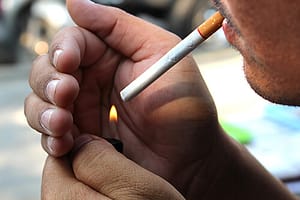
Cigarettes are smoked by most marijuana users, with about 1 in 5 people who use both substances – 1 in 3 among African Americans – using marijuana first. Recent research has also suggested that the initiation of tobacco use is more likely among adolescents who use marijuana weekly than those who use marijuana less frequently or not at all. These patterns partly arise given that some of the personal traits and social and environmental exposures that lead people to use marijuana may also predispose them to try other drugs.
The findings of the new research indicate that even with these influences taken out of the equation, marijuana use itself influences users to become regular smokers, making it more likely that they will become addicted to nicotine. The study was conducted by Dr. Leigh Panlilio and Dr. Steven Goldberg, alongside colleagues at the National Institute on Drug Abuse’s (NIDA) Intramural Research Program (IRP), the University of Texas Health Science Center at San Antonio and the University of Poitiers in France.
The researchers tested the hypothesis that marijuana’s psychoactive ingredient, THC, might serve as a “gateway” drug for nicotine. According to this hypothesis, the brain is pharmacologically sensitized by the brain to be more responsive to the rewarding and addictive effects of nicotine, making marijuana users who try tobacco more likely to continue their use of it. The researchers used laboratory rats to conduct their experiment, in order to isolate THC’s pharmacological effect from other possible factors affecting the consumption of nicotine.
From the 10th session of nicotine self-administration onwards, significantly more nicotine injections were self-administered by THC-exposed rats than animals that had not experienced THC exposure. The rats were required to poke their noses into a hole in the wall of the testing chamber in order to obtain a nicotine infusion. When the number of times that the rats needed to nose poke for a nicotine dose was increased, THC-exposed rats remained – on average – motivated to obtain an injection even up to 17 nose pokes. However, for saline-exposed control animals, motivation declined when the price increased to more than 11 nose pokes.
In light of this new evidence that THC exposure intensifies the rewarding and addictive effects of nicotine in rats, the researchers called for more examination of the possibility that people’s susceptibility to nicotine use and addiction is increased when they use marijuana.









